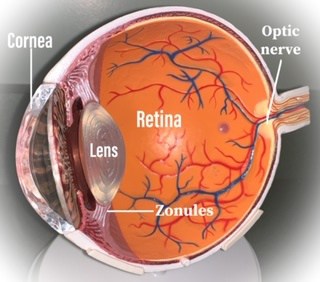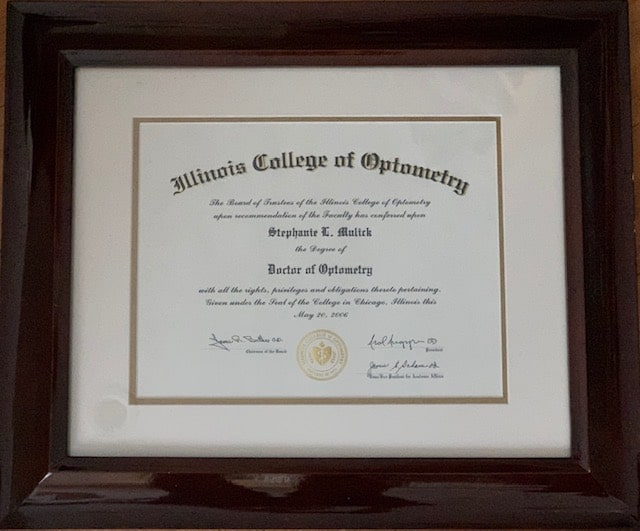Written By: Dr. Stephanie Mulick, O.D.
This question comes up all the time.
The main difference between an Optometrist and Ophthalmologist is the amount of schooling and the ability to perform surgery.
Similarities between Ophthalmologists and Optometrists
Ophthalmologists and Optometrists are both eye Doctors, both have a Bachelor’s Degree and a Doctorate Degree. They both perform health exams of the eyes. Yet there are quite a few distinctions between the two.
Differences between Ophthalmologists and Optometrists
Ophthalmologists obtain a bachelor’s degree, complete a 4-year Doctor of Medicine (M.D.) program and participate in a Hospital-based Ophthalmology residency for three years. Some go on to a 1-2 year fellowship program where they are trained at the highest level of clinical education in varying subspecialties.
There are several sub-specialties of Opthalmology including:
- Cornea
- Glaucoma
- Neuro-ophthalmology
- Oculoplastics
- Pediatrics-ophthalmology
- Retina-vitreous

Cornea Specialist
The cornea is the clear front surface of the eye. A cornea specialist is highly trained to treat corneal dystrophies, corneal ulcers, traumatic injuries, keratoconus, and any condition related to the cornea. Many corneal specialists perform corneal transplants and refractive surgeries such as LASIK. To learn more about refractive surgery options click here.
Glaucoma Specialist
Glaucoma is an eye disease that causes damage to the optic nerve. So a glaucoma specialist can be thought of as a specialist of the optic nerve. Glaucoma can present at any stage of life. There is a hereditary predisposition to developing glaucoma. Glaucoma is often thought of by patients as a high eye pressure disease; however, glaucoma can occur even in patients with normal intraocular pressure (IOP). An Ophthalmologist who specializes in Glaucoma will perform several measurements on your eye as well as a regular dilated eye exam. If you are diagnosed with glaucoma you may require medicated eye drops and more frequent visits with your eye doctor.
A Glaucoma specialist can perform glaucoma surgeries when deemed necessary to aid in the prevention of progressive optic nerve damage.
For more information on Glaucoma click here.
Neuro-ophthalmology
A neuro-ophthalmologist specializes in the eye and the brain. This can be helpful in patients with brain tumors, multiple sclerosis, strokes, and thyroid eye disease (for more information on thyroid eye disease click here).
Oculoplastic specialist
An Oculoplastic specialist is an Ophthalmologist who has extensive fellowship training after medical school in the eye, eyelids, and facial area around the eyes.
An Oculoplastic surgeon performs surgery on the skin around the eyes and the eyelids. This may include reconstruction from trauma, cancer, droopy eyelids or wrinkling skin around the eyes, blocked tear duct surgery, and even removal of the eye if necessary.
In my opinion, it is best to see an Oculoplastic specialist when it comes to the skin around your eyes rather than a plastic surgeon since the oculoplastic surgeon is specialized specifically in that area.
Pediatric Ophthalmology
As the name implies, pediatric Ophthalmologists specialize in the health of children’s eyes. They often have extensive training in the eye and the muscles of the eyes. Many pediatric specialists perform strabismus surgery for the treatment of “lazy eye” in children.
Click here to learn about lazy eye.

Retina-Vitreous Specialist
The eyeball is comprised of an anterior segment including the cornea, iris and lens and a posterior segment including the vitreous humor, the retina and the optic nerve.
The retina is the vascular-sensory tissue of our eye. Because there are many small blood vessels in the retina, it can be affected by vascular conditions such as high blood pressure, cholesterol and diabetes.
The vitreous humor is composed of a transparent gel-like substance that fills the space in the eyeball between the lens and the retina, this helps to maintain the structure of the eye by providing shock absorption and support to the retina. The vitreous humor must be clear so that light can pass through it.
The vitreous is enclosed in a clear membrane called the hyaloid membrane, which is attached to the retina in several areas. As we age, the vitreous humor becomes more liquid, a process termed syneresis. Syneresis of the vitreous humor can cause it to shrink and collapse as well as pull away from the retina. This process can cause us to perceive floaters or wispy shadows in our vision and sometimes flashes of lights, due to pulling on the retina. The separation of the vitreous humor from the retina is called a Posterior Vitreous Detachment (PVD). Review my post on flashes and floaters for more information.
A retinal specialist treats Retina holes, retinal tears, Retinopathy, macular degeneration, retinal edema, and many more conditions of the retina. They also can perform vitrectomies (removal of the vitreous) as well as vitreolysis, which is a laser into the vitreous to break up large floaters.
Optometrist
An Optometrist obtains a bachelor’s degree and completes a 4-year Doctor of Optometry (O.D.) program. Some Optometrists go on to a 1-year residency program in specialties including:
- Brain Injury Vision Rehabilitation
- Cornea and Contact Lenses
- Geriatric Optometry
- Low Vision Rehabilitation
- Ocular Disease
- Pediatric Optometry
- Primary Eye Care
- Vision Therapy and Rehabilitation
Optometrists are primary eye care providers who examine the health of your eyes and visual abilities, diagnosing eye diseases and conditions of the eye and visual system; they provide necessary treatment such as eyeglasses, contact lenses, vision therapy, and low vision aids. As a primary eye care provider your Optometrist will thoroughly examine the health of your eyes and refer to an Ophthalmologist for further treatment when necessary.

Conclusion:
What is the difference between an Ophthalmologist and an Optometrist?
The main difference is the amount of schooling and the ability to perform surgery. Optometrists obtain a Doctorate of Optometry (O.D.) degree from a 4-year program after completion of a bachelor’s degree. Ophthalmologists obtain a bachelor’s degree, complete a 4-year Doctor of Medicine (M.D.) program and participate in a Hospital-based Ophthalmology residency for three years. Some go on to a 1-2 year fellowship program where they are trained at the highest level of clinical education in varying subspecialties.
Optometrists are considered primary eye care providers who prescribe and dispense corrective lenses, diagnose and treat ocular conditions and refer to the proper Ophthalmology specialist as needed.
An Ophthalmologist also provides primary eye care and performs surgery when necessary.
Regardless if you see an Optometrist or Ophthalmologist, it is always recommended to have an annual eye exam.



Thank you for the amazing article